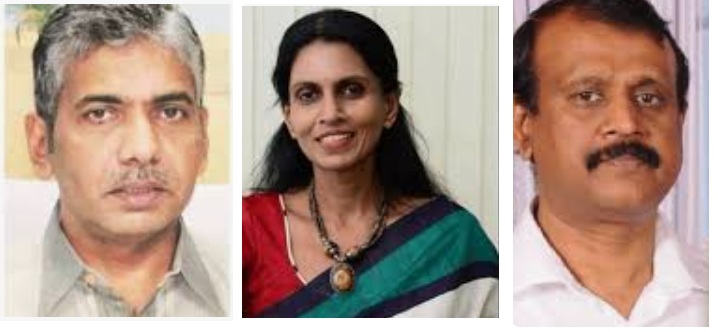By Nanditha Subhadra
In Kerala’s bipolar political playhouse, the BJP’s quest for a breakthrough has led it to embrace a parade of retired top cops—R. Sreelekha, T.P. Senkumar, Jacob Thomas, and others—who have now donned the saffron after years of actions that clashed with RSS and BJP interests. Their switch reeks of opportunism, timed suspiciously with probes into fund diversions, asset amassments, and inflammatory remarks. These ex-officers, who once targeted Hindu traditions and enforced measures against Sangh Parivar affiliates while in uniform, now expose a party trading ideological purity for quick-fix clout. With zero prior contribution to BJP or RSS, these ex-officers risk becoming liabilities: alienating voters, igniting internal dissent, and inviting electoral backlash.
These turncoats didn’t just flip; their service records reveal a pattern of antagonism toward RSS-BJP ecosystems. Sreelekha (retired 2020) joined BJP on October 9, 2024, amid a 2016 Vigilance probe for diverting Road Safety Funds to personal renovations and YouTube backlash for defending actor Dileep in the 2017 assault case. But her “ideological awakening” ignores her 2018 stint as DGP (Prisons), when she penned a scathing blog decrying the Kuthiyottam ritual at Attukal Devi Temple as a “yearly crime in the name of faith” and outright “torture” for young boys pierced with iron hooks during the Pongala festival. Her call for an end to this centuries-old Hindu tradition sparked outrage, leading the State Commission for Protection of Child Rights to register a suo motu case against the temple authorities—a direct affront to cultural practices defended by the Sangh Parivar. The temple trust condemned her, accusing her of interfering in voluntary rituals.
Similarly, T.P. Senkumar (joined BJP 2017, months post-retirement) faced cases for fake medical certificates and “love jihad” remarks promoting religious enmity—ironically aligning with Sangh rhetoric now. Yet during his tenure as DGP, he oversaw enforcement actions that curtailed BJP-RSS events, including stringent policing of processions and probes into alleged violations by Sangh affiliates amid communal tensions, drawing accusations from the right-wing of bias under LDF rule. Jacob Thomas (BJP 2021, full-time RSS pracharak October 2025) evades dredger scam and benami asset probes revived by the Supreme Court in 2023. As Vigilance chief, Thomas aggressively pursued graft cases that indirectly ensnared BJP-linked figures and disrupted Sangh-backed initiatives, while his outspoken criticism of government leniency toward “extremist” elements was seen by RSS as too even-handed, alienating hardliners. None attended shakhas or canvassed for BJP while in uniform; their “ideological awakening” conveniently aligns with legal heat and central power leverage, a stark U-turn from their service-era stances against Sangh Parivar interests.
Newly appointed Kerala BJP president Rajeev Chandrasekhar—himself a multi-party hopper who landed in BJP chasing power—views these khaki turncoats as “prize catches.” For him, they mirror his own trajectory. But to decades-old RSS-BJP cadre, they are backdoor entrants handed everything on a platter: out-of-turn prominence, poll tickets, and protection from Delhi. This fast-track elevation has sparked ripples of discontent, with loyalists feeling deprived as newcomers leapfrog them—especially those who view these ex-cops’ past anti-Sangh actions as unforgivable betrayals.
The pattern repeats the Suresh Gopi fiasco. A left-leaning Malayalam actor with no party history, Gopi was nominated to Rajya Sabha before formal membership, parachuted above veteran leaders to contest Thrissur LS seat, won in 2024, and was rewarded with junior ministerships in Tourism and Petroleum. Initial euphoria faded fast—his maverick, exhibitionist antics drew public censure and party core rebukes. Today, the Kerala unit and state chief sideline him. Yet the party repeats the error, inducting probe-tainted ex-cops who could prove even more damaging, their flip-flops from clashing with RSS traditions to embracing khaki-clad saffron now fodder for opposition memes.
Kerala’s 45% Muslim-Christian electorate and skepticism toward “probe dodgers” make these officers toxic. Sreelekha’s Dileep advocacy repels women, while her Kuthiyottam crusade alienates Hindu traditionalists; Senkumar’s minority-baiting alienates communities, even as his past policing of Sangh events fuels distrust; Thomas’s dredger baggage mocks his “crusader” image, compounded by his selective anti-corruption drive that spared no one, including BJP allies. Social media memes and opposition rallies already brand them “retirement rewards.” Thomas’s 2021 assembly third-place finish in Chalakudy proves they bring no vote magnet—only baggage. Adding to the roster are a handful of other retired Kerala IPS officers who’ve quietly joined the saffron brigade post-retirement, including figures like former SP-level officers who’ve aligned with BJP campaigns, though none match the high-profile trio’s visibility or controversy.
By prioritizing power-hungry defectors over principled growth, BJP risks diluting its 13% Lok Sabha vote share and municipal gains. Internal morale dips as cadre watch “sweatless” entrants steal the spotlight, their histories of acting against RSS-BJP when in power now a ticking bomb for unity. In chasing khaki clout, the party invites a boomerang: embarrassment, voter repulsion, and a reminder that opportunism in saffron suits the elite, not the everyman. Kerala’s discerning public sees through the charade—turncoats may win positions, but they’ll cost the BJP its credibility.


